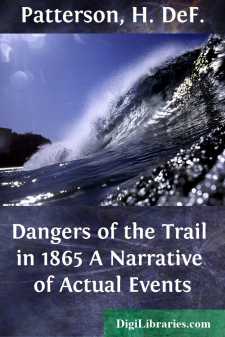Categories
- Antiques & Collectibles 13
- Architecture 36
- Art 48
- Bibles 22
- Biography & Autobiography 813
- Body, Mind & Spirit 142
- Business & Economics 28
- Children's Books 15
- Children's Fiction 12
- Computers 4
- Cooking 94
- Crafts & Hobbies 4
- Drama 346
- Education 46
- Family & Relationships 57
- Fiction 11828
- Games 19
- Gardening 17
- Health & Fitness 34
- History 1377
- House & Home 1
- Humor 147
- Juvenile Fiction 1873
- Juvenile Nonfiction 202
- Language Arts & Disciplines 88
- Law 16
- Literary Collections 686
- Literary Criticism 179
- Mathematics 13
- Medical 41
- Music 40
- Nature 179
- Non-Classifiable 1768
- Performing Arts 7
- Periodicals 1453
- Philosophy 64
- Photography 2
- Poetry 896
- Political Science 203
- Psychology 42
- Reference 154
- Religion 513
- Science 126
- Self-Help 84
- Social Science 81
- Sports & Recreation 34
- Study Aids 3
- Technology & Engineering 59
- Transportation 23
- Travel 463
- True Crime 29
Dangers of the Trail in 1865 A Narrative of Actual Events
Categories:
Description:
Excerpt
CHAPTER I
Early in 1859 gold was discovered in Colorado, and Horace Greeley, the well known writer and a power throughout the country both before and during the Civil War, made, in the interest of the New York Tribune, of which he was editor, an overland trip to Denver by the first stage line run in that day. He started from Leavenworth, Kansas, and with the exception of Mr. Richardson, of the Boston Journal, was the only passenger in the coach. The trip was not all that could be desired, for they met with numerous hardships and many narrow escapes, as did hundreds of others who had preceded them over that dangerous trail, many never reaching their destination—having met death at the hands of the cruel Indians of the plains.
During his stay in Denver Mr. Greeley wrote a number of letters to the New York Tribune, confirming the finding of gold in the territory and advising immigration. The people in the East were skeptical in regard to its discovery and awaited a written statement from him to this effect.
At the close of the war Mr. Greeley's advice to young men, through the columns of his paper, was to go West and grow up with the country, and it became a byword throughout the State of New York and the Nation, "Young man, go West and grow up with the country."
Could Mr. Greeley have foreseen the number of young lives that were to be sacrificed through his advice, I think he would have hesitated before giving it; yet, it was the most valued utterance of any public man of that day for the settlement of the then Far West.
After reading a number of these letters in the New York Tribune, I became very enthusiastic over the opportunities that the West offered for the young man. There was also a loyal friend of mine who became as enthusiastic over it as myself. Thus, while we were still so young as to be called boys, we made up our minds to follow Mr. Greeley's advice, and "Go West and grow up with the country."
MAP OF TRAILS LEADING FROM MISSOURI RIVER TO DENVER, COLORADO
1865
In making our purchases for the trip we were obliged to make our plans known to an acquaintance, who at once expressed a desire to accompany us. After consultation, we consented and at the appointed time, the fore part of July, 1865, just at the close of the Civil War, we boarded a New York Central train at the depot in Geneva, N. Y., with no thought of the hardships and dangers we would be called upon to meet.
The first night found us at the Falls of Niagara—the most stupendous production of nature that the country was known to possess at that time. Our time was divided between the American and Canadian sides, viewing the grand spectacle at all hours, from the rising to the setting of the sun; and, awed by the marvelous masterpiece of grandeur, we were held as if fascinated by its beauty, until we were forced to leave for the want of food and to replenish our commissary. When we boarded the cars to be whirled through the then wilds of Lower Canada, we were liberally supplied with the best the country produced.
Upon the fifth day we rolled into Chicago, the cosmopolitan city of the West. Two days later we reached Quincy, Ill., where we made connection with the old Hannibal & St. Joe Railroad which was to take us through Missouri to Atchison, Kansas. Missouri, after the war, was not an ideal state for a law abiding citizen, much less for inexperienced youths of our age, and we quickly realized that fact. Many stations had their quota of what was termed the Missouri bushwhacker, or, more plainly speaking, outlaws, who, during the war and for some time after, pillaged the state and surrounding country, leaving in their wake death and destruction. They had belonged to neither side at war, but were a set of villians banded together to plunder, burn, ravage and murder young and old alike; as wicked a set of villians as the world has ever known....


